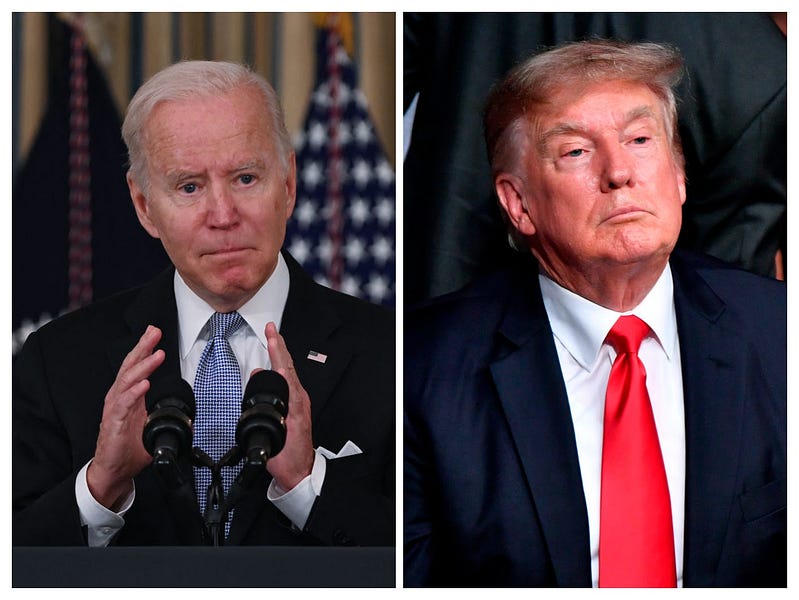The 2016 presidential election was so notable, among other reasons, because it pitted the two least-liked major-party nominees in modern political history against each other.
In an average of the five final high-quality polls of 2016, 41.4 percent of voters had a favorable opinion of Hillary Clinton, and 37.4 percent felt similarly about Donald Trump. That was about 10 points below the candidates in the rancorous 2012 election and about 5 points worse than Trump and President Biden in the historically heinous 2020 contest.
Well, if you thought 2016 was a race to the bottom, 2024 is shaping up to be a journey to the center of the earth.
The most recent NBC News poll (which has carried on with its all-star bipartisan team of pollsters after their former partners at the Wall Street Journal bailed out), has gotten a lot of attention for its finding that Biden has reached the lowest job approval rating of his term at 40 percent. As one would expect, Biden’s poor showing was driven by voter concerns over rising prices and the economy in general. But the poll also dashes Democratic hopes that Biden would get a boost from the mostly united response of Americans in opposition to Russia’s effort to conquer Ukraine.
Seventy-nine percent of respondents backed Biden’s decision to ban imports of Russian oil “even if it causes higher gas prices,” and 43 percent said they would be willing to pay an additional 50 cents or more per gallon if that’s what was necessary. And only 7 percent of respondents had a negative opinion of Ukrainian President Volodymyr Zelensky. But 52 percent of those polled disapproved of Biden’s handling of the crisis, which means his troubles go far beyond reflexive Republican nyets.
The auguries for Democrats in November are as bad as Biden’s approval numbers would suggest. Just 44 percent of respondents said they prefer a Democratic-controlled Congress. That’s the lowest share of the electorate since the fall of 2014, when the Republicans gained nine Senate seats, the most for either party in a generation.
But the number to watch for 2024 is Biden’s favorability rating. Like Barack Obama before him, Biden routinely had higher favorability numbers than job performance numbers—a reflection that voters liked him even when they disagreed with his policies or choices. That gap reflects voters who might be persuaded to still back an incumbent despite their frustrations.
Not anymore. Biden slid to 37 percent in his latest favorability rating, the worst of his career. That’s a 19-point drop since he took office, which suggests not just that voters don’t like Biden’s governance, but that they don’t like him. Given Biden’s ongoing fumbling of big opportunities, like his off-prompter misadventure in Poland, it’s hard to see hope for Biden’s short-term prospects.
The good news for Biden in the poll, though, is that the leading contender for the 2024 Republican nomination is even less liked than the incumbent. Trump clocks in at a puny 36 percent favorability, which matches his all-time low during his presidency in January 2018—when he oversaw a government shutdown over his border wall demands and referred to immigrants from “s–thole countries.” And Trump’s negatives are even higher than Biden’s, with strong disapproval running at 41 percent to Biden’s 37 percent. In sum: Biden’s net favorability is -9, while Trump’s is -14. Woof.
Among Republicans, Trump’s hold remains strong: 40 percent of self-identified Republicans in the poll said they were “more of a supporter of Donald Trump” than “a supporter of the Republican Party.” In January, Trump hit his all-time low in that category—36 percent—since pollsters started asking the question three years ago. It’s still far from the all-time high of 54 percent in April 2020, but a 4-point gain is still noteworthy.
That bump, though, didn’t help Trump’s No. 1 issue: his effort to overturn or discredit the results of his 2020 re-election defeat. In January, 16 percent of respondents listed “voting rights and election integrity” as the most important issue facing the country—No. 2 on the list of concerns, behind only jobs and the economy. That number ticked down to 13 percent this month, but, more significantly, it fell to fourth on the worry list as the cost of living and Russia’s war against Ukraine pushed past it.
The 13 percent who still think election procedures are the most important issue facing the United States are about evenly divided between righties who are more worried about security and lefties who are more worried about access, but both are in their own way a reflection of concern about Trump’s claims about the 2020 election. The manufactured controversy appears to be ebbing and is now getting close to perennial concerns like global warming and the federal budget.
That’s why this is such a dog of an issue for Republicans in 2022 and why doing things like Trump did Saturday at his Georgia rally, where he and his guests obsessed over the issue, are so foolish. This is like “defund the police,” a kooky idea that plays well with a highly active but very narrow slice of the electorate. Of course, the alternative topics for Trump’s crew are not exactly catnip for swing voters either. Yeesh. But the 2020 kookiness is the most damaging because it has so much potency in the GOP primary electorate, and is too attractive for desperate candidates to resist, despite the harm it will do in the general election.
And don’t forget that voters are seriously turned off by both parties. Just 34 percent of respondents had anything good to say about the GOP, and only 33 percent could muster the same for the Dems.
It is a seriously open question whether either of the very elderly, largely unpopular men who are now the favorites to be their parties nominees in two years will actually make it to the platform. But if they do, get ready for a battle that would make the 2016 muck-fest look like Mr. Rogers’ Neighborhood.
Chris Stirewalt is a contributing editor of The Dispatch.







Please note that we at The Dispatch hold ourselves, our work, and our commenters to a higher standard than other places on the internet. We welcome comments that foster genuine debate or discussion—including comments critical of us or our work—but responses that include ad hominem attacks on fellow Dispatch members or are intended to stoke fear and anger may be moderated.
With your membership, you only have the ability to comment on The Morning Dispatch articles. Consider upgrading to join the conversation everywhere.